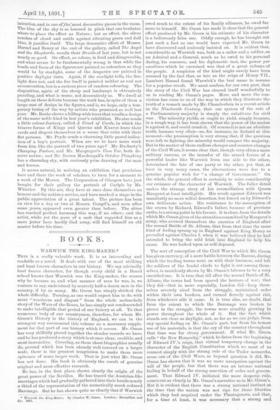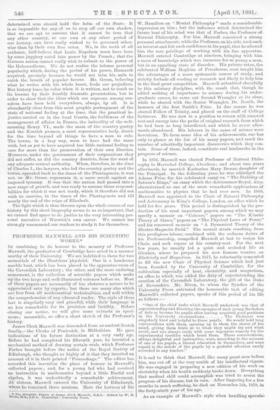BOOKS.
WARWICK THE KING-MAKER.* True is a really valuable work. It is as interesting and readable as a novel. It deals with one of the most striking and least known characters in our history. We say advisedly least known characters, for though every child in a Board school knows that Warwick was the King-maker, the reason why he became so, and what manner of man he was, is, we venture to say, understood by scarcely half-a-dozen men in the country, if by so many. Mr. Green has simply shirked the whole difficulty. Turning, as one would expect him to do, with mere "weariness and disgust" from the whole melancholy story of the Wars of the Roses, he has simply not condescended to make intelligible that period of our history at all. To that numerous body of our countrymen, therefore, for whom Mr. Green's History is the history of England, we can in the strongest way recommend this volume as a necessary supple- ment for that part of our history which it covers. Mr. Oman has very skilfully pieced together the slender records we have, and he has produced a story which is at once clear, credible, and most instructive. Covering, as these short biographies usually do, ground which has been already well covered on a larger scale, there is the greatest temptation to make them mere epitomes of some larger work. That is just what Mr. Oman has not done. His book is obviously the result of genuine original and most effective research.
He has, in the first place, shown clearly the origin of the great power of the Nevilles. He has traced the Austrian-like marriages which had gradually gathered into their hands nearly a third of the representation of the numerically much reduced Baronage. But he has shown quite as clearly that if Warwick
Warwick the King-Maker. By Charles W. Oman. London; Macmillan and Co. 1891.
owed much to the extent of his family alliances, he owed far more to himself. Mr. Oman has made it clear that the general
effect produced by Mr. Green in his estimate of his character is a ludicrously false one. Oddly enough, he has brought out• just such a fact as one would have expected Mr. Green to have discovered and zealously insisted on. It is evident that, considerable as Warwick was, both as a sailor and a soldier, as
an Admiral and a General, much as he owed to his personal daring, his resource, and his diplomatic tact, the power par
excellence which he exercised was that of a great tribune of the people. A suspicion of the kind might surely have been aroused by the fact that, as late as the reign of Henry VII., Lambert Simnel found Warwick's the best name to assume for a popular revolt. We must confess, for our own part, that the story of the Civil War has cleared itself wonderfully to us in reading Mr. Oman's pages. More and more the con- viction has come to as of the way in which they illustrate the truth of a remark made by Mr. Chamberlain in a recent article in the Nineteenth Century, that our system of the rule of a Parliamentary majority is simply the substitute for civil war. The minority yields, or ought to yield, simply because, in a rough way, it has been shown that the power of the nation is against it, and could crush it. Of course it is not an absolute truth, because very often—as, for instance, in Ireland at this moment—the presumption is very strong that, if the question. were left to fighting, the minority would conquer the majority. But in the matter of these endless changes and counter-changes of the Civil Wars, it seems clear that, though very often a mere military success, or the transfer of the armed forces of a, powerful leader like Warwick from one side to the other, determined the fate of one party or the other, yet that, at least in very many cases, the alternations were due to a genuine popular wish for " a change of Government." On the whole, the general effect is certainly to raise considerably our estimate of the character of Warwick. The fuller detail makes the strange story of his reconciliation with Queen Margaret at least intelligible. His revolt against Edward was manifestly no mere wilful desertion, but forced on by Edward's own deliberate action. His resistance to the assumption of the crown by Richard, Edward's father, because of previous oaths, is a strong point in his favour. It is clear, from the details which Mr. Oman gives of the atrocities committed by Margaret's army, who avowed themselves the enemies of England after the second Battle of St. Albans, that from that time the same kind of feeling sprang up in England against King Henry as prevailed against Charles I. when it was believed that ho had intended to bring the wild Irish into England to help his cause. He was looked upon as self-deposed.
The sort of conception of the Civil War to which Mr. Green has given currency, of a mere battle between the Barons, during which the trading towns went on with their business, and left the soldiers of the feudal chiefs to fight it out among them- selves, is manifestly shown by Mr. Oman's labours to be a very onesided one. It is true that till after the second Battle of St. Albans, the towns had been spared the horrors of war ; that they did—that is, more especially, London did—keep them- selves severely aloof from the struggle, maintained order within their own borders, and turned fiercely against riot, from whichever side it came. It is true also, no doubt, that from the extent to which the Baronage was broken to pieces in the struggle, the towns were steadily growing in. power throughout the whole of it. But the fact which stands out clear as daylight, not, so far as we can judge, from any special feeling on Mr. Oman's part, bat from his honest use of his materials, is that the cry of the country throughout that time was for strong government. If what Mr. Green calls " the New Monarchy," which he dates from the beginning of Edward IV.'s reign, that virtual temporary change in the character of the English Constitution which we most of us connect simply with the strong rule of the Tudor monarchs, arose out of the Civil Wars, as beyond question it did, Mr. Oman has shown that it was no mere usurpation against the will of the people, but that there was an intense national feeling in behalf of the strong assertion of order and govern- ment. That Edward IV. initiated the more despotic rule, comes out as clearly in Mr. Oman's narrative as in Mr. Green's. But it is evident that there was a strong national instinct at the time that the nation was not ripe for those liberties which they had acquired under the Plantagenets, and that, for a time at least, it was necessary that a strong and determined arm should hold the helm of the State. It is so impossible for any of us to step of our own shadow, that we are apt to assume that it cannot be true that any other country, or our own at any other period of our history, can have really wished to be governed other- wise than by their own free votes. We, in the teeth of all .evidence, half-believe that Louis Napoleon must have been by some jugglery voted into power by the French ; that the 'German nation cannot really wish to submit to the power of the Hohenzollerns. We do not realise the intense personal popularity which, during the period of his power, Bismarck .acquired, precisely because he would not trim his sails to catch the breath of popular favour. Mr. Green, believing what he writes with his whole heart, feeds our prejudices. But history loses its value when it is written, not to teach us its lessons by their frankly dramatic presentation, but in order to show that the ideas which are supreme among our- selves have been held everywhere, always, by all, It is abundantly clear from this most graphic portrayment of the state of national feeling at the time, that the practical in- justice carried on in the local Courts, the feebleness of the management of affairs in France, the imbecility of the well- meaning Henry VI., made the mass of the country gentry and the Kentish yeomen, a most representative body, desire for the time beyond all things to have a man to rule. The towns, in a lazy way, seem to have bad the same wish, but as yet to have acquired too little national feeling to ,care for more than the preservation of their own liberties. Moreover, under the government of their corporations they did not suffer, as did the country districts, from the want of any adequate central authority. When, therefore, in the time of Charles I., the lawyers, who led the country gentry and the towns, appealed back to the times of the Plantagenets, it was not, as Mr. Green represents it, a mere revolt against an imposed tyranny. It was that the nation had passed into a new stage of growth, and was ready to assume those responsi- bilities for which it was not ready, which it therefore did not wish to exercise, in the times of the Plantagenets and till nearly the end of the reign of Elizabeth.
The light which is thus thrown upon the whole course of our history by this short biography seems to us so important, that we cannot find space to do justice to the very interesting per- sonal narrative of Warwick's own career. We cannot too .stron gly recommend our readers to study it for themselves.



































 Previous page
Previous page